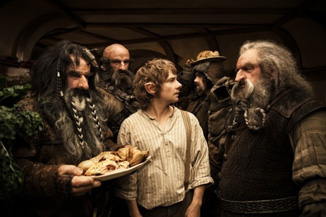|
|
Mythology: Middle-earthBy Martin FelipeAugust 6, 2012
I’d say it’s true of most stories enjoying passionate fan bases. Look no further than Harry Potter or Hunger Games fans debating the nuances of their film adaptations. Rings, however, due to its age and enduring popularity is in a bit of a class of its own. In the months and years leading up to The Lord Of The Rings movies’ release, Tolkien fans of all ages poured over each and every tidbit of information they could get their hands on, endlessly arguing the merits or weaknesses of every choice Jackson made in bringing their favored fantasy world to the screen. You see, in the world of modern mythologies, few are as detailed and internally consistent as that of Middle-earth. Tolkien was a linguist who created his own language, then built the world, the culture, the history, and even the story around it. As he wrote more and more about Middle-earth, he would revise and fine tune what came before to make sure it all fit and made sense. He was an early George Lucas in that respect, from a certain point of view. This isn’t to say that Middle-earth is perfect, but you’d be hard pressed to find another fictional universe as intricate and developed as this one. As such, generations of fans have become students of not just the story, but of the cultures, languages and history of Middle-earth. Bringing this universe to cinematic life was Jackson’s challenge, and fans were not going to give him an inch. Of course, the result has become Hollywood legend. All three films enjoyed glowing reviews, stellar box office and buckets full of awards and nominations. It’s one of recent cinema’s greatest triumphs. Nevertheless, as will always be the case, especially with such a beloved property, there are detractors. Even with over 11 hours of story in their extended form, the trilogy takes certain liberties with the narrative and cuts quite a bit of material from the books. Understandable though this may be, fans will be fans, and everyone seems to have their own idea of how this change or that difference could have made the movie into the adaptation that they really wanted.
|

|
|
|

|
Friday, November 1, 2024
© 2024 Box Office Prophets, a division of One Of Us, Inc.


